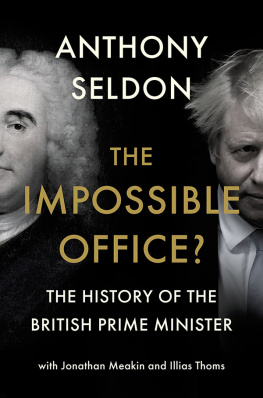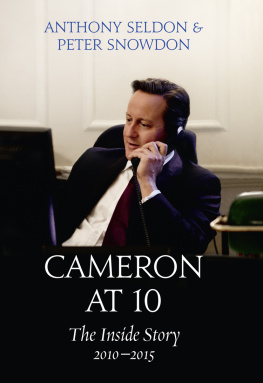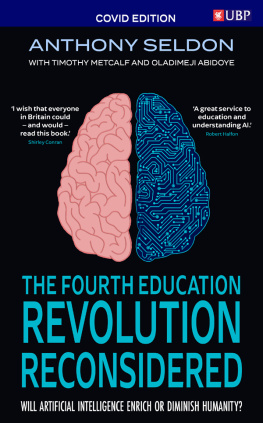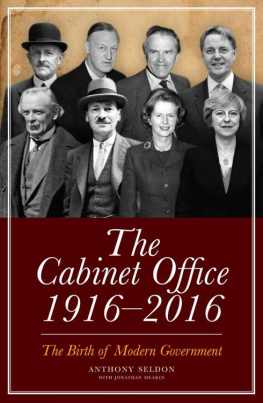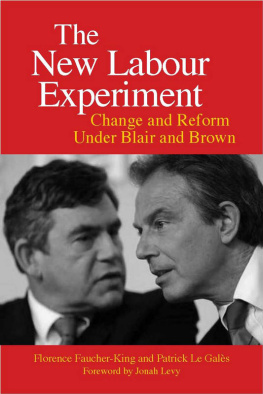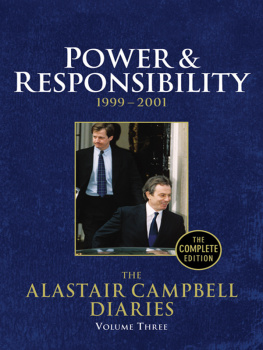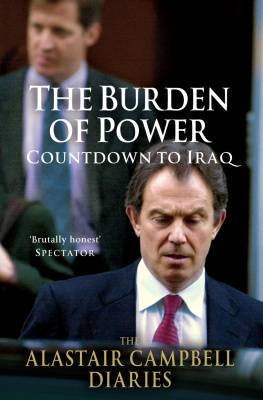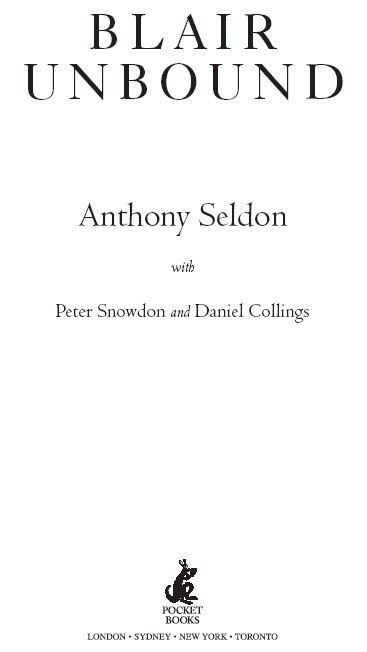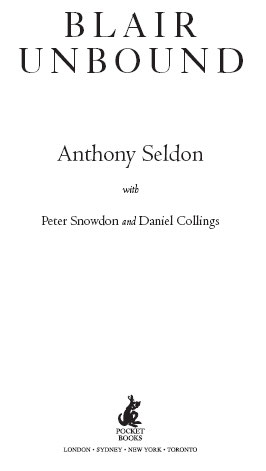Anthony Seldon is a political historian, biographer and commentator on British political leadership as well as on education and contemporary Britain. He is also Master of Wellington College, one of the countrys leading independent schools, was formerly head of Brighton College, and was co-founder and first Director of the Institute of Contemporary British History. He is the author or editor of some twenty-five books, including the authorised life of John Major, which remains the definitive account of Majors seven years at Number 10, and the highly acclaimed first volume of his biography of Tony Blair (2004).
Peter Snowdon has collaborated with Anthony Seldon on many books since 1997, including the biographies of John Major and Tony Blair. They also co-authored The Conservative Party: An Illustrated History. He works as a broadcast journalist in London.
Daniel Collings is a writer, journalist, researcher and TV producer specialising in Anglo-American relations. He has worked on landmark biographies of Margaret Thatcher, John Major and Tony Blair with Anthony Seldon and others.
ALSO BY ANTHONY SELDON
Churchills Indian Summer (1981)
By Word of Mouth (with Joanna Seldon, 1983)
Contemporary History (ed., 1987)
Ruling Performance (with Peter Hennessy, 1987)
Political Parties Since 1945 (ed., 1988)
The Thatcher Effect (ed. with Dennis Kavanagh, 1989)
Politics UK (joint author, 1991)
The Conservative Century (ed., 1994)
The Major Effect (ed. with Dennis Kavanagh, 1994)
The Heath Government 19701974 (ed. with Stuart Ball, 1996)
The Contemporary History Handbook (ed. with Brian Brivati, 1996)
The Ideas That Shaped Post-war Britain (ed. with David Marquand, 1996)
How Tory Governments Fall (ed., 1996)
Major: A Political Life (1997)
10 Downing Street: An Illustrated History (1999)
The Powers Behind the Prime Minister (with Dennis Kavanagh, 1999)
Britain Under Thatcher (with Daniel Collings, 2000)
The Foreign Office: An Illustrated History (2000)
The Blair Effect 19972001 (ed., 2001)
A New Conservative Century? (with Peter Snowdon, 2001)
Public and Private Education: The Divide Must End (2001)
Partnership not Paternalism (2002)
Brave New City (2002)
New Labour, Old Labour (ed. with Kevin Hickson, 2004)
Blair (2004)
The Conservative Party: An Illustrated History (with Peter Snowdon, 2004)
The Blair Effect 200105 (ed. with Dennis Kavanagh, 2005)
First published in Great Britain by Simon & Schuster in 2007
This edition first published by Pocket Books in 2008
An imprint of Simon & Schuster UK Ltd
A CBS COMPANY
Copyright 2007 by Anthony Seldon and Peter Snowdon
This book is copyright under the Berne Convention.
No reproduction without permission.
All rights reserved.
The right of Anthony Seldon and Peter Snowdon to be identified as
the authors of this work has been asserted by them in accordance with
sections 77 and 78 of the Copyright, Designs and Patents Act, 1988.
Simon & Schuster UK Ltd
Africa House
6478 Kingsway
London WC2B 6AH
Simon & Schuster Australia
Sydney
www.simonsays.co.uk
A CIP catalogue for this book is available from the British Library.
ISBN 10: 1-84739-499-X
ISBN 13: 978-1-84739-499-6
This book is dedicated to the
memory and example of my father,
Arthur Seldon (19162005),
described in his obituary in The Economist
as The architect of Thatcherism and Blairism.
Introduction
From the Making of Tony Blair to Blair Unbound
This is the second volume of a two-part biography. The first volume, entitled simply Blair, was published in 2004, and concentrated on Tony Blairs life up to his second term in office. My aim in that book was to explain how an initially unambitious man, who displayed little interest in politics or public life at school, university or in his early legal career, rose to become one of the most successful Labour leaders in modern British politics. Almost all other Prime Ministers, including Margaret Thatcher, John Major, and latterly Gordon Brown, displayed from their earliest years not only an acute interest in politics but also a burning ambition to rise through the ranks. Not Tony Blair. The structure of the first book was designed to help explain this essential conundrum: it consisted of forty chapters, twenty devoted to the people and twenty to the events that emboldened, inspired and moulded this unformed and callow young man into the person he became by 2001. The argument was that, under their influence, Tony Blair forged himself into a superbly effective, election-winning force. He excelled at presentation and at politics, but he had yet to mature as a policy-maker, or to work out what he wanted to do with power. His own policy preferences remained incomplete and naive, consisting of a mish-mash of Christianity, social democracy and the vogue-ish and ultimately insubstantial third way. Blair was a story of electoral success but disappointment on policy.
All the individuals who had helped shape him on his rise to power played key parts, but none more so than his mother, who died when he was just twenty-two years old, and who helped give him his boundless self-confidence and his life-long anchor in religious faith. Another woman, his wife Cherie, was the other dominant force in his life, firing his zeal for the Labour Party, grounding him in the stability of family life and encouraging him to live out his faith. He loved her deeply and would not have become, nor remained, Prime Minister for so long without her. The dominant non-family figures who made possible his rise, and that of New Labour, were the quartet, Gordon Brown, Alastair Campbell, Peter Mandelson and lifelong friend Anji Hunter. In the early 1990s they had been bound together by a mutual love, a deep commitment and a shared sense of purpose: the determination to see Labour sweep John Majors Conservatives from power. Subsequently, this tight-knit group split up with spectacular consequences. The first blow to their unity came in 1994, when Brown felt betrayed by Blair over his succession as Labour leader following the death of John Smith in May that year. Brown could scarcely believe that a man he considered his junior and inferior had leapfrogged over him to lead the party. Consolation came from the understanding Brown believed he had reached with Blair at the Granita restaurant at the end of May: that he would effectively be running domestic policy in a joint premiership and that Blair would stand down for him mid-way through the second term.
As Leader of the Opposition from 1994 to 1997, Blair boldly weaned the party off its attachment to the symbolically significant Clause Four, but caution overcame him in the latter two years as he became fixated on a Labour victory at the General Election. Nothing was more illuminating about him at this time than his first appointment on winning the leadership election in July 1994. It was not a policy chief, nor a figure with deep experience in either the party or government, but a head of media relations, Alastair Campbell. Blair was so desperate to have him onside that he pursued him personally to the South of France to persuade him. Blair also leaned heavily on another brilliant media guru, Peter Mandelson, who like Campbell was far more versed in presentation than policy. The 1997 manifesto was unsurprisingly light on detailed commitments. Substance, Blair insisted, would flow once Labour was safely in power. As with most other of his predecessors in Number 10, however, he found devising policy on the wing took second place to the business of running the nation. His first term showed that Labour was safe to run the country, but he was strong on windy aspiration and rhetoric, and low on personal domestic policy achievements. Hubris came to the fore. He had transformed the Labour Party: surely transforming the country, and creating a new Britain, would not be too difficult? Only towards the end of the first term did Blair wake up to reality: time was being squandered, and changing Britain was a more serious and difficult proposition than he had imagined. His personal record was all the more disappointing when measured against the advantagesa large majority, a united party and a strong economyfew incoming Prime Ministers have ever enjoyed.


